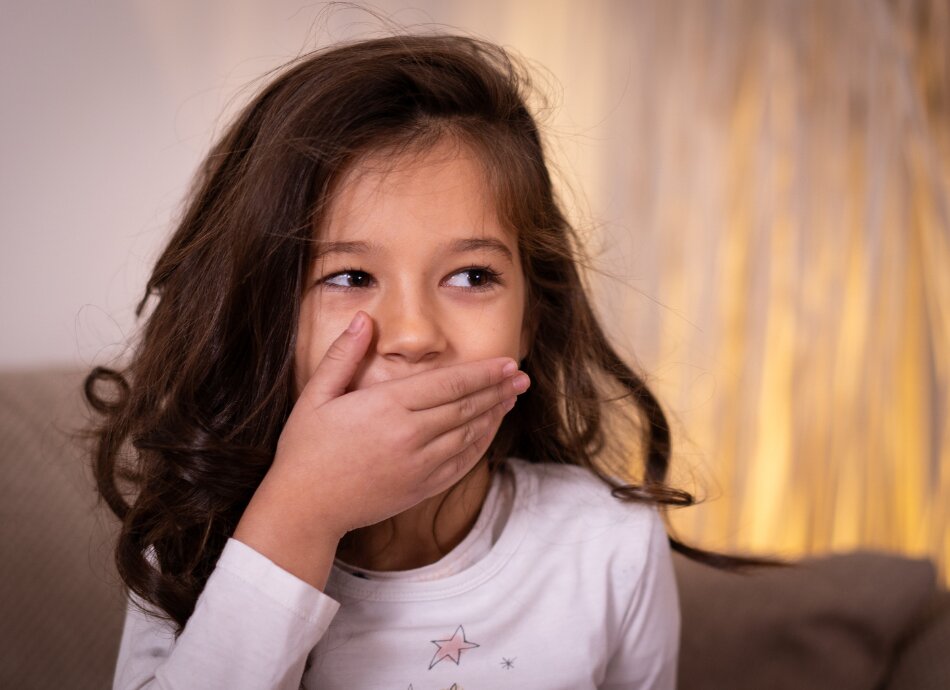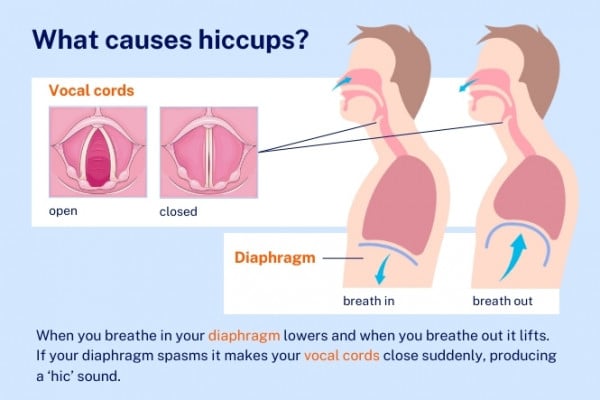If you're a frequent visitor to Healthify, why not share our site with a friend? Don't forget you can also browse Healthify without using your phone data.
Hiccups
What causes the hiccups?
Key points about hiccups
- Hiccups are involuntary sounds caused by an uncontrollable spasm of your diaphragm.
- Hiccups are usually harmless and go away on their own after a short time.
- However, if they don't go away they might be a sign of an underlying issue.
- See your healthcare provider if your hiccups continue for more than 48 hours, or are interfering with eating, sleeping or breathing.

Hiccups are repeated spasms or sudden, involuntary movements of your diaphragm that you can’t control. They're usually harmless and go away on their own after a short time. However, if they don't go away they might be a sign of an underlying issue.
The diaphragm is the muscle that separates your abdomen from your chest and plays an important role in breathing. When your diaphragm spasms, your vocal cords suddenly close – producing the ‘hic’ sound of hiccups.

Image credit: Healthify He Puna Waiora and Laboratoires Servier, CC BY-SA 3.0(external link) via Wikimedia Commons
While the cause of hiccups is usually unknown, sometimes they can be triggered by certain things. These include:
- eating hot or spicy food
- eating too quickly
- eating too much
- swallowing air, eg, when smoking or chewing gum
- drinking too much alcohol or carbonated drinks
- being stressed
- getting too excited
- pregnancy
- a bad smell.
Sometimes hiccups can be caused by certain medicines (eg, epilepsy medication) or as a side effect of surgery. Very occasionally, hiccups can be the symptom of a more serious underlying condition or disease. Read more about possible causes of ongoing hiccups(external link).
Hiccups cause an involuntary ‘hic’ sound from uncontrolled spasms in your diaphragm.
Other symptoms might include a slight sensation of tightening in your chest, stomach area or throat.
While most hiccups are harmless and only last for a few minutes, they can be annoying, uncomfortable and bit embarrassing. There are a lot of suggestions out there on how to get rid of them – some may work, some may not. Here are some to get you started:
- Hold your breath for a short time.
- Take deep breaths.
- Breathe into a paper bag (not plastic).
- Suck on a lemon (rinse your mouth with water afterwards as the acid can affect your teeth).
- Eat a small slice of fresh ginger.
- Drink a glass of water slowly.
- Drink from the wrong side of a glass.
- Suck on an ice cube or eat ice chips.
- Gargle with water
- Get someone to scare you.
- Bend from the waist or sit down and lean forward over your knees.
- Reach up and hang from a door frame. By stretching out your diaphragm, it might ease the spasms.
If you have hiccups that last for days or weeks it might mean there's another issue that needs to be explored. When they last for a long time, it can feel exhausting. Contact your healthcare provider if your hiccups haven’t gone away after 48 hours, or if they keep coming back and are affecting your breathing, sleeping or eating.
If your hiccups aren’t going away, your healthcare provider will try to find the reason for them by asking about your health conditions and any medicines you’re taking. Treating any conditions and adjusting medicines may help. If there’s no obvious cause of ongoing hiccups there are medicines that may help, eg, chlorpromazine.
Hiccups(external link) Patient Info, UK
References
- Hiccups(external link) Better Health Victoria, Australia, 2014
- Hiccups(external link) Mayo Clinic, US, 2023
- Hiccups(external link) NHS, UK, 2023
Credits: Healthify editorial team. Healthify is brought to you by Health Navigator Charitable Trust.
Last reviewed:





